|
|
|
Sort Order |
|
|
|
Items / Page
|
|
|
|
|
|
|
| Srl | Item |
| 1 |
ID:
170017
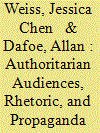

|
|
|
|
|
| Summary/Abstract |
How do government rhetoric and propaganda affect mass reactions in international crises? Using two scenario-based survey experiments in China, one hypothetical and one that selectively reminds respondents of recent events, we assess how government statements and propaganda impact Chinese citizens’ approval of their government's performance in its territorial and maritime disputes. We find evidence that citizens disapprove more of inaction after explicit threats to use force, suggesting that leaders can face public opinion costs akin to audience costs in an authoritarian setting. However, we also find evidence that citizens approve of bluster—vague and ultimately empty threats—suggesting that talking tough can provide benefits, even in the absence of tough action. In addition, narratives that invoke future success to justify present restraint increase approval, along with frames that emphasize a shared history of injustice at the hands of foreign powers.
|
|
|
|
|
|
|
|
|
|
|
|
|
|
|
|
| 2 |
ID:
117990
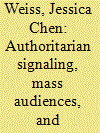

|
|
|
|
|
| Publication |
2013.
|
| Summary/Abstract |
How can authoritarian states credibly signal their intentions in international crises? Nationalist, antiforeign protests are one mechanism by which authoritarian leaders can visibly demonstrate their domestic vulnerability. Because protests in authoritarian states are risky and costly to repress, the decision to allow or stifle popular mobilization is informative. The threat of instability demonstrates resolve, and the cost of concession increases the credibility of a tough stance. The danger of instability and escalation increases foreign incentives to make concessions and preserve the status quo. This logic helps explain the pattern of authoritarian tolerance and repression toward nationalist protest. A case study of two U.S.-China crises shows how China's management of anti-American protests affected U.S. beliefs about Chinese resolve.
|
|
|
|
|
|
|
|
|
|
|
|
|
|
|
|
| 3 |
ID:
173695
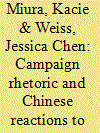

|
|
|
|
|
| Summary/Abstract |
Although China tends to be an important topic in election campaigns, the consequences of this rhetoric have not been systematically examined. We highlight the process by which China uses campaign rhetoric to make inferences about the intentions of new leaders in the US, Taiwan, and Japan. We identify two key criteria – consistency and change – that guide Chinese assessments. In turn, three patterns define Chinese policy toward new administrations: proactive engagement when campaign rhetoric is consistent with other indicators of policy change; reactive engagement when rhetoric is consistent with continuity; and a wait and see approach when rhetoric is inconsistent with the candidate’s past actions and the reputation of close advisors. Our findings push back against arguments linking leadership transitions to international conflict. Rather than testing the resolve of new leaders with military probes, foreign states can use information overheard during elections to gauge their counterparts’ intentions and ensure stability immediately after elections.
|
|
|
|
|
|
|
|
|
|
|
|
|
|
|
|
| 4 |
ID:
144797
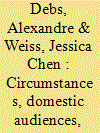

|
|
|
|
|
| Summary/Abstract |
We present a new theory of interstate crisis bargaining. A country’s resolve is a function of intrinsic qualities of the government and external circumstances, both of which are unknown by the domestic electorate and the foreign country. When domestic political debate reveals that circumstances favor the use of force, the government can extract better terms than if circumstances are revealed to be unfavorable. The revelation of circumstances, however, exacerbates reputational incentives. Because governments can no longer hide behind unknown circumstances, voters can better discern the government’s type from its actions, strengthening the incentives to appear resolved. The model bridges the gap between audience costs and its critiques, showing how domestic audiences punish leaders for inappropriate policies rather than empty threats. At the same time, it highlights how the prospects for peace are worse if uncertainty about the circumstances is removed, suggesting that greater transparency does not always promote peaceful outcomes.
|
|
|
|
|
|
|
|
|
|
|
|
|
|
|
|
| 5 |
ID:
178580
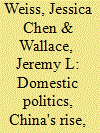

|
|
|
|
|
| Summary/Abstract |
With the future of liberal internationalism in question, how will China's growing power and influence reshape world politics? We argue that views of the Liberal International Order (LIO) as integrative and resilient have been too optimistic for two reasons. First, China's ability to profit from within the system has shaken the domestic consensus in the United States on preserving the existing LIO. Second, features of Chinese Communist Party rule chafe against many of the fundamental principles of the LIO, but could coexist with a return to Westphalian principles and markets that are embedded in domestic systems of control. How, then, do authoritarian states like China pick and choose how to engage with key institutions and norms within the LIO? We propose a framework that highlights two domestic variables—centrality and heterogeneity—and their implications for China's international behavior. We illustrate the framework with examples from China's approach to climate change, trade and exchange rates, Internet governance, territorial sovereignty, arms control, and humanitarian intervention. Finally, we conclude by considering what alternative versions of international order might emerge as China's influence grows.
|
|
|
|
|
|
|
|
|
|
|
|
|
|
|
|
| 6 |
ID:
167481
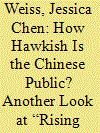

|
|
|
|
|
| Summary/Abstract |
Chinese leaders often invoke the feelings of the Chinese people in international disputes. However, most survey research on Chinese public opinion on international affairs has looked at measures of nationalist identity rather than beliefs about foreign policy and evaluations of the government’s performance. Five surveys of Chinese citizens, netizens, and elites help illuminate the attitudes that the Chinese government grapples with in managing international security policy. The results suggest that Chinese attitudes are more hawkish than dovish and that younger Chinese, while perhaps not more nationalist in identity, may be more hawkish in their foreign policy beliefs than older generations. Netizens and elites are even more inclined to call on the Chinese government to invest in and rely more on military strength.
|
|
|
|
|
|
|
|
|
|
|
|
|
|
|
|
| 7 |
ID:
147912
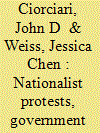

|
|
|
|
|
| Summary/Abstract |
While the existing literature emphasizes that elites often have incentives to pander to nationalist sentiment, much less attention has been paid to elite efforts to subdue popular nationalism, either to avoid domestic instability or international escalation. This article examines how different governments respond to nationalist protests and the resulting effects on the risk that interstate disputes will escalate to armed conflict. We argue that government responses to nationalist protests tend to vary in patterned ways across regime types. Nationalist protests present particular dangers in weakly institutionalized democracies, where demonstrations often pose serious threats of instability but are difficult or costly for the government to subdue, tempting or forcing leaders to escalate to appease domestic critics. We illustrate the theory with four cases representing a range of regime types: Vietnam, Cambodia, Thailand, and the Philippines.
|
|
|
|
|
|
|
|
|
|
|
|
|
|
|
|
| 8 |
ID:
139560
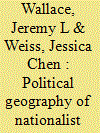

|
|
|
|
|
| Summary/Abstract |
Why do some Chinese cities take part in waves of nationalist protest but not others? Nationalist protest remains an important but understudied topic within the study of contentious politics in China, particularly at the subnational level. Relative to other protests, nationalist mobilization is more clustered in time and geographically widespread, uniting citizens in different cities against a common target. Although the literature has debated the degree of state-led and grassroots influence on Chinese nationalism, we argue that it is important to consider both the propensity of citizens to mobilize and local government fears of instability. Analysing an original dataset of 377 anti-Japanese protests across 208 of 287 Chinese prefectural cities, we find that both state-led patriotism and the availability of collective action resources were positively associated with nationalist protest, particularly “biographically available” populations of students and migrants. In addition, the government's role was not monolithically facilitative. Fears of social unrest shaped the local political opportunity structure, with anti-Japanese protests less likely in cities with larger populations of unemployed college graduates and ethnic minorities and more likely in cities with established leaders.
|
|
|
|
|
|
|
|
|
|
|
|
|
|
|
|
| 9 |
ID:
191875
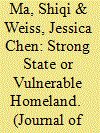

|
|
|
|
|
| Summary/Abstract |
Departing from its typical silence on pro-democracy movements around the world, Chinese state media encouraged a flood of reports about the 2019 Anti-Extradition Law Movement in Hong Kong . This article investigates two different media framing strategies to prevent democratic diffusion: demobilizing the masses by emphasizing state capacity and repression, and rallying the masses by emphasizing threats to national unity. Analyzing an original dataset of articles about the Hong Kong protests in the People’s Daily, this article documents a greater overall reliance on the rallying strategy, a tendency that became particularly pronounced in the later stage of the protest movement. Chinese media selectively reported events that would emphasize threats and downplayed stories about repression.
|
|
|
|
|
|
|
|
|
|
|
|
|
|
|
|
| 10 |
ID:
150965
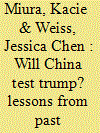

|
|
|
|
|
| Summary/Abstract |
China was in the crosshairs of both U.S. presidential candidates this election season. Republican candidate Donald J. Trump pledged to put an end to Chinese trade policies that “rape” the U.S. economy, while Democratic candidate Hillary R. Clinton criticized China's record on human rights and island-building activities in the South China Sea.
|
|
|
|
|
|
|
|
|
|
|
|
|
|
|
|
|
|
|
|
|